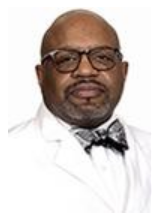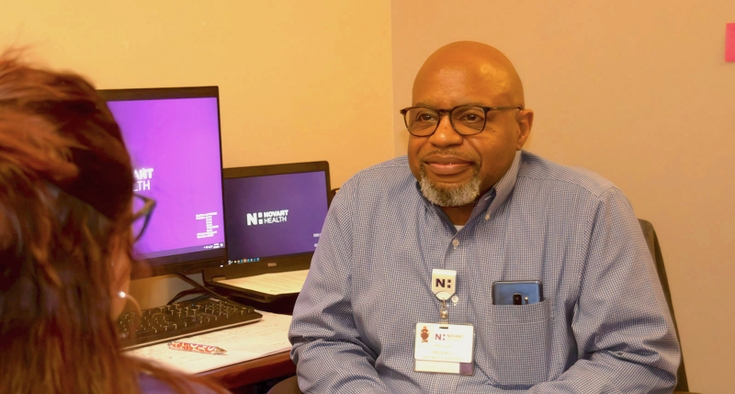Three years ago, clinical social worker Greg Johnson became Novant Health’s first mental-health counselor to embed in a primary care clinic.
Each week at Davie Medical Associates in Mocksville, Johnson sees about 35 adults and teenagers who might be grieving a loved one’s death, or struggling with a career or parental hardship.
This specialty care in Charlotte and Winston-Salem is meant to enhance – not replace – long-term psychiatric treatment during what are often long stretches between available appointments. More than half the country lacks convenient access to mental-health providers, the federal Health Resources & Services Administration reports.
To help meet the perpetual need for behavioral health care, Novant Health primary care clinics are screening for anxiety and depression symptoms during checkups, and offering some patients onsite counseling during the same visit.

“It’s about providing a good example so they can model what they see in front of them,” said Johnson, 63. “I encourage them to breathe and find that inner peace, whether that’s spiritually or just getting outside for some fresh air.”
Embedding these therapies “means that the patient doesn’t need a referral outside of Novant Health to meet with someone who doesn’t have a connection to their history,” said senior physician executive Dr. Ashley Perrott. “We want people to feel better faster.”
Good health starts with great primary care.
‘I always wanted to help people’
When Johnson was 8, his father, Thomas Randolph Johnson Jr., was killed while off-duty. He patrolled housing projects for the New York Police Department, and had been targeted by a gang.
Clinics screen all patients for symptoms of anxiety and depression, and offer immediate, onsite referrals to embedded clinical social workers.
- The resource is generally offered for up to six weeks.
- It is especially convenient for patients in rural communities who would otherwise have to travel long distances for grief counseling.
- If insurance doesn’t cover it, payment can be made on a sliding scale fee.
Johnson’s mother and uncle helped raise him, and a fellow officer of his father’s took the child under his wing. Together they went skating, skiing and sailing, anything to keep Johnson engaged and out of trouble. He later joined the Boy Scouts, and was an altar boy. Things were looking up.
In high school, Johnson spent many late nights playing Monopoly tournaments on the porch with friends. Over time, several began to confide in him. Johnson listened as they opened up about their own struggles with family. Saying those things out loud was unusual in the 1970s, Johnson said.
For a long time, especially in the African American community, it was, ‘What happens at home stays at home.’ We didn’t share our issues,” Johnson said. “That has since changed considerably.”
A degree in computer science landed Johnson a job as a financial-control specialist at Citibank in Manhattan. But he wasn’t happy.
It was years before Johnson found his calling in social work. A minister put him in touch with a group home, where Johnson was encouraged to pursue a human services degree. He earned his master’s in social work, and began working with people with HIV/AIDS. Johnson also offered guidance to men who had committed domestic violence.
“I realized that I loved working with people,” Johnson said. “I was in my 30s when I decided I was going to do something in social services.”
Helping athletes in Charlotte
In Charlotte, Novant Health Orthopedics & Sports Medicine – Cotswold offers appointments with sports psychologists.
Making the connection
Eventually Johnson moved to North Carolina in search of warmer weather and a fresh start.
He started at a major healthcare organization and contracted with a juvenile detention center, an experience that cemented Johnson’s interest in entering private practice as a therapist. In 2021, Johnson joined Novant Health, where he exercises empathetic listening and body language when meeting with patients.
“If I see someone agitated, I stand next to them rather than in front of them,” he said. “I’m using my gut as my guide. I initially disclose some things about my family and my upbringing. That way they can feel that I’m truly a person, and not just somebody who’s going to just take notes while they lay on the couch. I want to have a dialogue together to help them get to a better place.”
Johnson, a father of three, says his grown children are advancing his passion in their own professions as counselors, political representatives and attorneys.
“My kids are all helpers,” he said. “I encouraged them to get their education, to be happy, and to serve a purpose.”
Johnson’s purpose? Empowering people to find peace within themselves.
“It’s about understanding people,” he said. “And that’s what got me into this field: Wanting to know what makes people tick.”
One patient’s story
For most of her life, Leann Dodd kept her feelings to herself. But that changed last year after a visit with her general practitioner.
As part of that appointment at Davie Medical Associates in Mocksville, Dodd was asked a series of questions meant to assess her behavioral health. She has been going through a lot; not long after her mother died, Dodd’s husband was diagnosed with cancer.
Right after the screening, she was referred to a counselor on-the-spot, inside the same building. Dodd said she felt comfortable enough to give therapy a try for the first time, and met with Greg Johnson.
“At first I was one of those people who was against going to therapy,” Dodd said. “But I was pleasantly surprised when I went in and found him very open and easy to talk to. I realized from appointment to appointment that he was listening to me and asking questions that helped me think about things from a different perspective. And having him there with my doctor in the same office has been very convenient.”
Dodd has met with Johnson for several months, and says having the ear of a neutral third party has helped ease her grieving.
“It is very good for me to have a sounding-board,” she said. “It’s a good outlet for me to get all those feelings and emotions out there and not feel judged by anybody."










